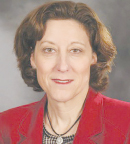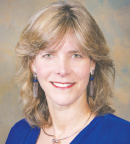
Hope S. Rugo, MD, FASCO

Laura J. Esserman, MD, MBA, FASCO
Hope S. Rugo, MD, FASCO, Professor of Medicine, Director of Breast Oncology and Clinical Trials at the University of California, San Francisco (UCSF), Helen Diller Family Comprehensive Cancer Center, said the residual cancer burden index is being increasingly used in medical oncology. “The cellularity of residual disease—how dense the cells are in the residual disease—is something that oncologists have not thought of much. But now we are able to put that into context in terms of outcomes, and this will really affect how we treat patients,” she said.
“In the post-neoadjuvant setting, being able to stratify patients is incredibly important for affecting outcomes and also for minimizing toxicity for patients who actually will have a very good outcome despite having minimal residual disease,” she said.
Laura J. Esserman, MD, MBA, FASCO, the Alfred A. de Lorimier Endowed Chair in General Surgery and Director of the Carol Franc Buck Breast Care Center at UCSF Helen Diller Family Comprehensive Cancer Center, commented on the value of using residual cancer burden in the I-SPY trials, which she leads. “Dr. Symmans has standardized the process for how to evaluate the disease left after neoadjuvant treatment. It’s not just a read-out of cellularity. It’s how the specimens are processed,” she said.
She noted that a good evaluation of residual cancer burden cannot be accomplished by examining one tissue section. “It’s that you look at it in a very careful way,” she explained.
The value of the residual cancer burden index is evident by the fact that for 10 years, across 22 trial sites, the I-SPY basket trials have used it as a standard for evaluating residual disease, Dr. Esserman continued. “We hope the results of this study will change the [American Joint Committee on Cancer] staging system…to include a special section on what the standard should be for the care of women who have undergone neoadjuvant therapy. There has to be training and commitment to using this in a consistent way, so we can rely on the information. It’s critical for our patients.” ■
DISCLOSURE: Dr. Rugo has received research funding from Daiichi Sankyo, Eisai, Genentech, Immunomedics, Lilly, MacroGenics, Merck, Novartis, OBI Pharma, Pfizer, Odonate Therapeutics, and Seattle Genetics; and has been reimbursed for travel, accommodations, and other expenses by AstraZeneca, Amgen, Daiichi Sankyo, MacroGenics, Merck, Novartis, OBI Pharma, Pfizer, Puma Biotechnology, Roche/Genentech, Mylan, and Sanofi. Dr. Esserman reported no conflicts of interest.

